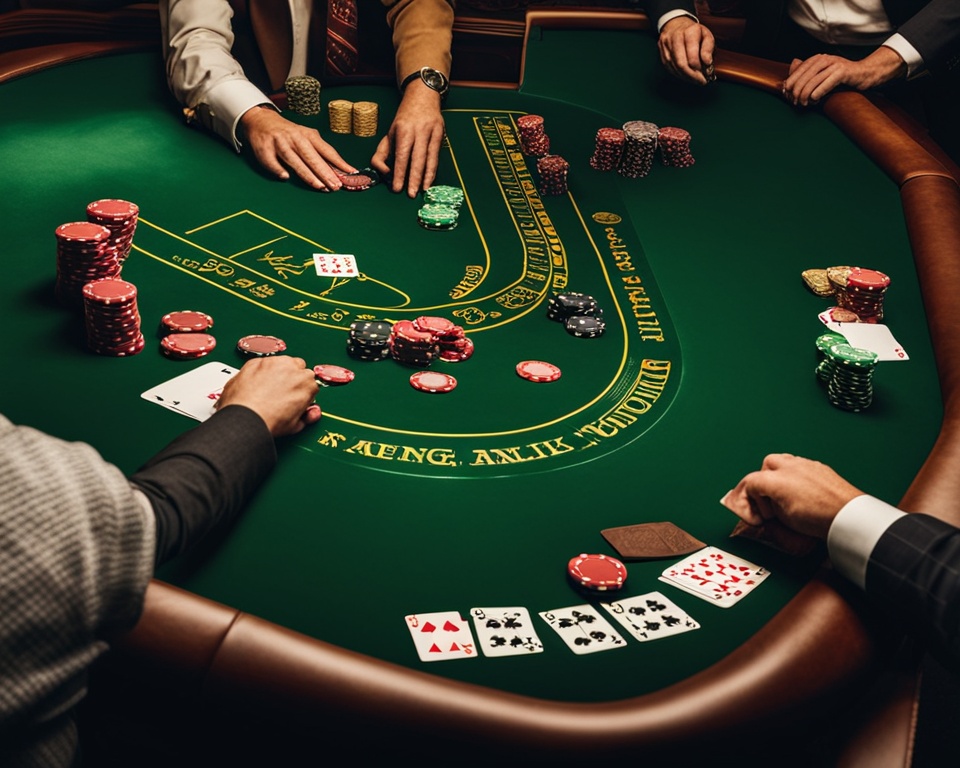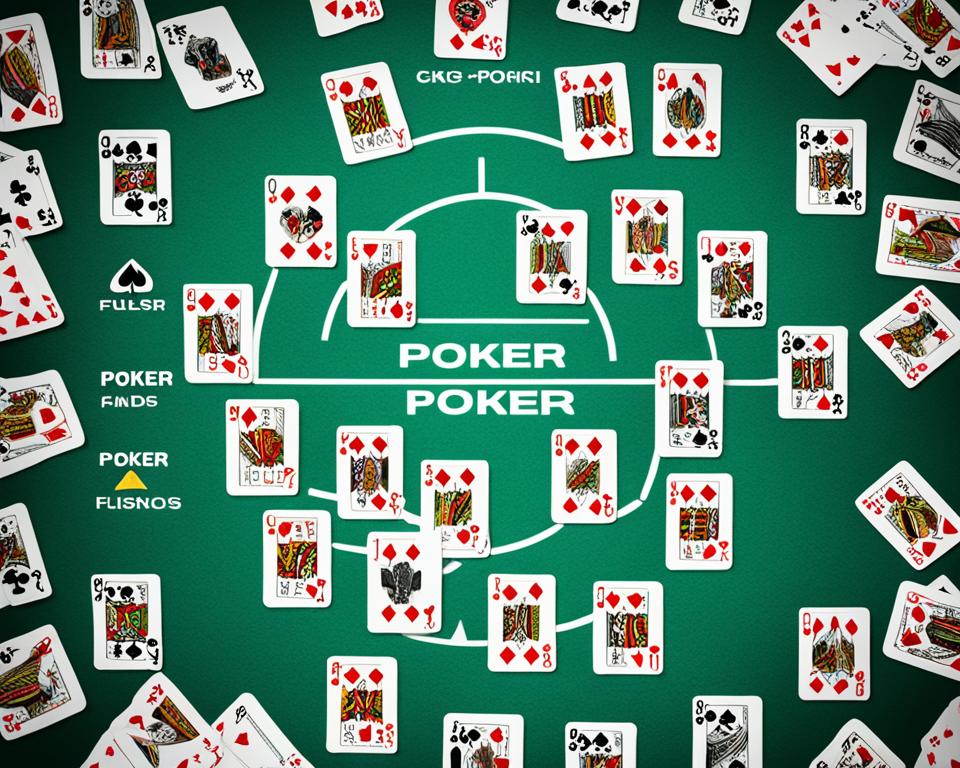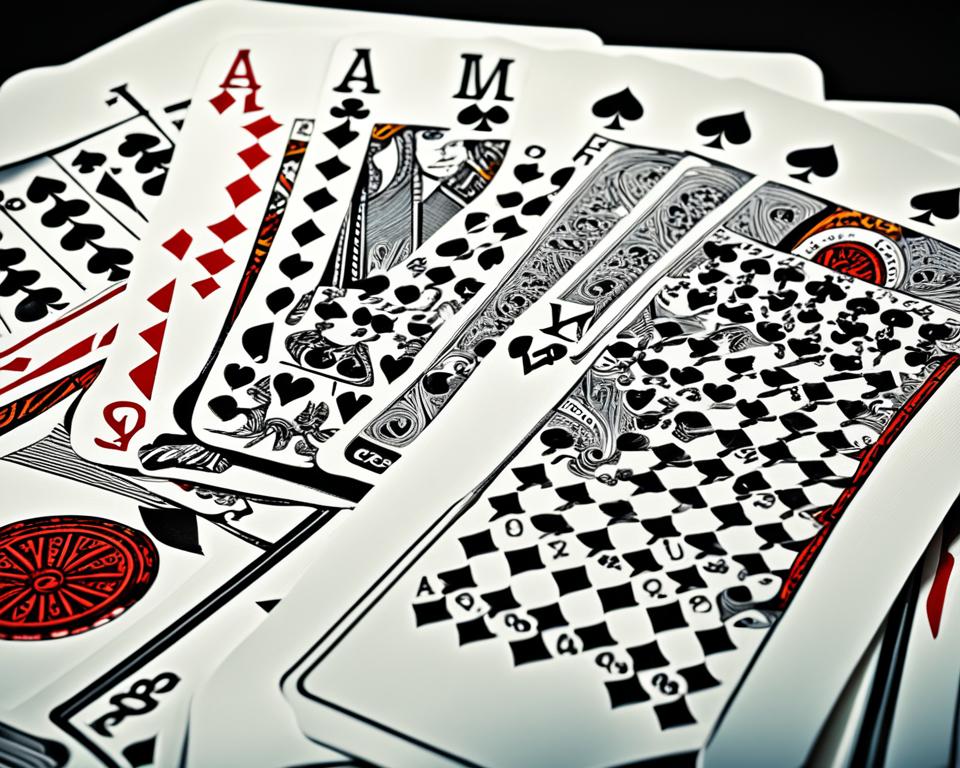Learning when to bet in poker is crucial for winning consistently. This guide will help you understand the key betting rules. It covers strategies for knowing if your hand is strong, why your seat at the table matters, the best ways to bet, and how to handle your money wisely.
It’s designed for both new players and those who’ve been playing for a while. You will learn about poker betting strategy, poker hand evaluation, pot odds, position play, bluffing tactics, bankroll management, poker psychology, and tournament strategy. By the end, you’ll feel more confident in your betting choices and understand the game better.
Take this journey with us to master poker when to bet. Learn the tips to up your game and win more money. Are you ready to improve your poker skills and become a smarter player? Let’s get started!
Understanding Poker Betting Fundamentals
Being good at poker means knowing the main betting rules and terms well. We’re going to cover the key points that will help you make smarter poker betting decisions. This will lift your game overall.
Poker Betting Rules and Terminology
Learning the basic poker betting rules and terms is your first step. You’ll study things like checks, bets, raises, calls, and folds. This knowledge builds your base for a solid poker betting strategy. It helps you move through hand stages more smoothly.
Pot Odds and Implied Odds Calculations
Understanding pot odds and implied odds is crucial. Pot odds show the relationship of the pot’s size to your call’s cost. They help you decide if you should call based on your chance of winning. Implied odds look at possible future wins if you make your hand. They give a deeper look into the risk and reward. Knowing how to use these odds will seriously change your poker betting strategy.

Evaluating Your Hand Strength
Finding out how strong your poker hand is can be the key to success. It can mean the difference between winning and losing. Let’s look at how to understand poker hand rankings and how to read your hand with accuracy.
Pre-Flop Hand Rankings
Knowing poker hand rankings before the flop is key. It tells you the worth of your starting hands. This info helps you decide whether to play, fold, or adjust your bets. We’ll cover pocket pairs, high card hands, and suited connectors, equipping you for pre-flop choices.

Post-Flop Hand Reading Strategies
After the flop, it’s all about understanding your hand’s strength. We’ll look at strategies to evaluate your hand and your opponent’s. This includes spotting potential combinations and draws. Learning these post-flop strategies will help you make better betting moves to win more.
Mastering Position Play
Your seat at the poker table really matters. It decides the best ways to bet. Understanding poker position play boosts your choices and wins. We’ll talk about early position and late position. You’ll learn how to use each spot to play better.
Early Position Considerations
If you’re in early position, you might have to act first. This situation is tough. Your hand must be strong to bet or raise. Here, you should play safe and smart. Think about what stronger hands others might have. Also, consider how the pot might grow later.
Late Position Advantages
But, being in late position is awesome. You’ll know more when it’s your turn. This lets you bet with more confidence. You can spot chances to bluff or get rid of weak hands. Playing from late position means you’re more in charge. You increase your shot at winning.
Poker When to Bet: Optimal Betting Strategies
This guide’s main focus is the key question: when to bet in poker. It explores the details of the best times to bet. This knowledge will help you get the most from your strong hands. You will also learn how bluffing and semi-bluffing can be useful tactics.
Value Betting with Strong Hands
Skilled poker players are good at spotting when they’re ahead. They use value betting to win more. This strategy can help you grow the pot and increase your winnings. It’s about knowing when to bet just right, so your opponents make mistakes.
Bluffing and Semi-Bluffing Tactics
Bluffing and semi-bluffing are vital in poker. They can help you make others fold and balance your game. To bluff well, you must understand the game state, your rivals’ moves, and how to bet. Doing this makes it hard for others to know what you have. This can lead to more wins.
The mix of value betting and bluffing is at the core of poker’s best strategies. By learning these concepts and using them well, you can become very good at poker. These skills will help you in many poker situations.
Bankroll Management Essentials
Good poker bankroll management is key for any poker player’s success. It’s about keeping your money safe while you play. We will look at important ideas and ways to handle your money well in this article.
It’s vital to choose the right amount to spend on games or tournaments. Experts say you should use only 5-10% of your total money each time. This wise choice can protect you from losing a lot too quickly.
Session management is just as important. It means deciding ahead when to stop playing if you’re winning or losing. This stops you from falling into risky traps that might make you lose more. With clear rules, you can stand strong against poker’s many surprises.
We’ll also talk about ways to make poker bankroll management less risky. This includes spreading your money out, keeping a special poker fund separate, and using tools to keep track of your spending. These steps lessen the chances of big losses over time.
Using these strategies will help keep your poker money safe. And by doing so, you increase your chances of doing well in the exciting poker world for a long time.
Poker Psychology and Tilt Control
Many underestimate the mental side of poker, but it’s key to lasting success. Having a strong poker psychology and managing tilt are vital for any player. Let’s look into why emotional intelligence matters and ways to handle variance and recover from bad beats.
Emotional Intelligence at the Table
Keeping your emotions in check is important in poker. Poker psychology means knowing your own and others’ feelings. With more emotional intelligence, you can make calmer, smarter choices. You’ll steer clear of tilt reactions and spot when your opponents are off their game.
Know the signs of tilt, like getting more aggressive or losing focus. When you feel tilted, step back. Use relaxation techniques to calm down. This will help you get back to playing your best.
Dealing with Variance and Bad Beats
Poker is all about variance, and even great players face bad beats. It’s crucial to deal with these setbacks well. Remember, bad beats are part of the game. Your long-term success matters more than single unlucky hands.
Focus on what you can change, like how you play, manage your money, and handle your feelings. Understand poker’s ups and downs. Turning these into chances to grow your psychological skills makes you stronger.
Adjusting to Different Poker Formats
Experienced poker players know strategies change with each game type. Whether it’s a poker cash game or a poker tournament, knowing key adjustments is vital to win. It’s important to make sure your play style is profitable and flexible.
Cash Game Strategy Adjustments
In a poker cash game, focus on making the most money per hour. This means being patient and careful. You should also focus on value betting. Additionally, it’s crucial to manage your money wisely. In this setting, take these steps to improve your game:
- Make bigger bets with strong hands to win more
- Use more bluffing and half-bluffing to keep opponents guessing
- Choose stronger hands before the flop to play
- Change how aggressive you are based on your opponents’ actions
Tournament Poker Strategy Tweaks
When in a poker tournament, strategy becomes subtler and more flexible. With blinds and antes that go up, and a need to last longer than many others, it’s key to change how you bet. For tournaments, make these adjustments:
- Be more aggressive and try to win more chips in the early and mid-stages
- Be stricter with when you bet big or fold, especially against aggressive players
- Think about your chip amounts and the prize structure to make better decisions
- Focus on staying alive and advancing as the prize increases
By learning how to adjust for different poker types, you’ll do better in games. This applies to both poker cash games and poker tournaments.
Poker Software and Training Resources
To lift your poker skills, use the many tools and training online. Here, we look at the impact of poker tracking and analysis tools. Also, we check out the best poker training sites and courses. They offer expert lessons for those wanting to become better.
Poker Tracking and Analysis Tools
Good poker software and trackers change how you play for the better. These tools help you record your games and give insights. You can see your winning moves and points to work on. This helps tweak your poker strategy for the win.
Online Poker Training Sites and Courses
Along with tracking tools, top-notch online poker training can boost your game. The best poker training sites have lots to learn from, like videos and quizzes. They also run poker courses for different levels. Learning from the best sharpens your skills, like understanding how to play in each round and how to bet smartly.
Using the latest poker software and training tools can really up your poker game. They help you understand the game better. And they lead you to make better decisions and play smarter.
Live Poker Etiquette and Considerations
At live poker events, it’s vital to know and follow live poker etiquette rules. This means being respectful and considerate at the table. Doing so can make the game more fun for you and others.
Good live poker etiquette starts with paying attention. Don’t talk too much or use your phone. This can mess up the game. Also, play at a good speed and follow what the dealer says quickly.
It’s also key to be kind to other players at the table. Don’t say mean things or start arguments. The aim is for everyone to have a good time while playing.
Handling chips and cards the right way is crucial. Keep your chips tidy, don’t make a mess, and be gentle with the cards. This prevents any unfair moments during the game.
Following these live poker etiquette tips helps you be seen as a good player. More importantly, it makes the poker games better and more fun for all.
Continuing Poker Education and Improvement
Becoming a top poker player is a journey that never ends. It demands a dedication to always learning and getting better. We’ll share tips here to boost your poker skills and keep you ahead of the pack.
Reviewing Hand Histories
Improving at poker means taking a close look at your past games. Reviewing your hand histories helps you see what you did right and what needs work. It highlights crucial insights into your strategy and playing style.
When you analyze your poker hand review, you understand yourself better as a player. You’ll discover your strengths and weak points. This self-examination is key to getting better and reaching higher levels in poker.
Seeking Coaching and Feedback
Getting insights from experts is vital for growth in poker. Signing up for a training program or getting personal coaching can be a game-changer. It offers you specific advice to overcome your poker challenges.
Experienced poker coaches provide valuable outside perspectives. They help you see your game in a new light. Their advice is tailored to your unique play style, making it easier to improve and succeed in the long run.
Navigating Legal and Ethical Poker Landscapes
As you dive further into poker, it’s key to grasp its legal and ethical frameworks. We will explore the current online poker legalities, along with advice on responsible gambling. This helps ensure you follow laws and stay safe while enjoying the game.
Online Poker Legalities
The rules for online poker vary and change from place to place. To avoid issues, know the laws in your area. We will shed light on these rules, helping you play online poker confidently.
Responsible Gambling Practices
Playing responsibly is a must in many places and keeps your poker hobby on a healthy track. We will discuss how to approach responsible gambling. This includes tips for managing your money and setting limits. Following these steps makes poker more fun and less risky.
Building a Successful Poker Career
Dreaming of making a career out of poker? It’s vital to have the right mindset and keep a balance in life. Successful players have certain traits and routines that keep them ahead in the game.
Developing a Winning Mindset
To make it in the poker world, you must be tough and adaptable. Stars like Phil Ivey and Doyle Brunson show us how discipline and emotional smarts matter. Always looking to improve helps deal with poker’s ups and downs. This makes you a better and more self-assured player.
Balancing Poker and Life
Keeping a good balance between poker and your personal life is key. Big names in poker, like Daniel Negreanu and Vanessa Selbst, stress the importance of a healthy lifestyle. They say managing stress and self-care matters a lot. By making poker part of your daily life, you can avoid getting overwhelmed and keep going strong.
To succeed in poker, you need more than just skill. You need the right mindset and lifestyle too. Learn from the pros. Find what works best for you. This way, you can achieve great things in the exciting world of poker.



